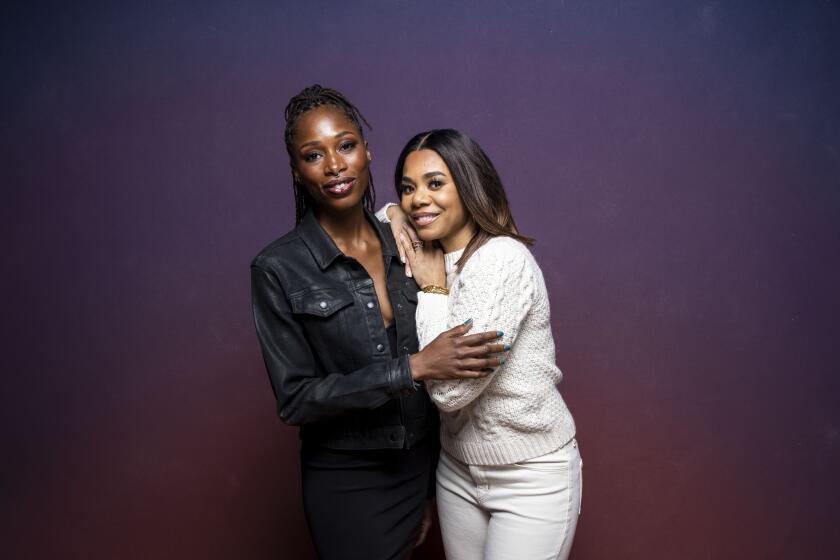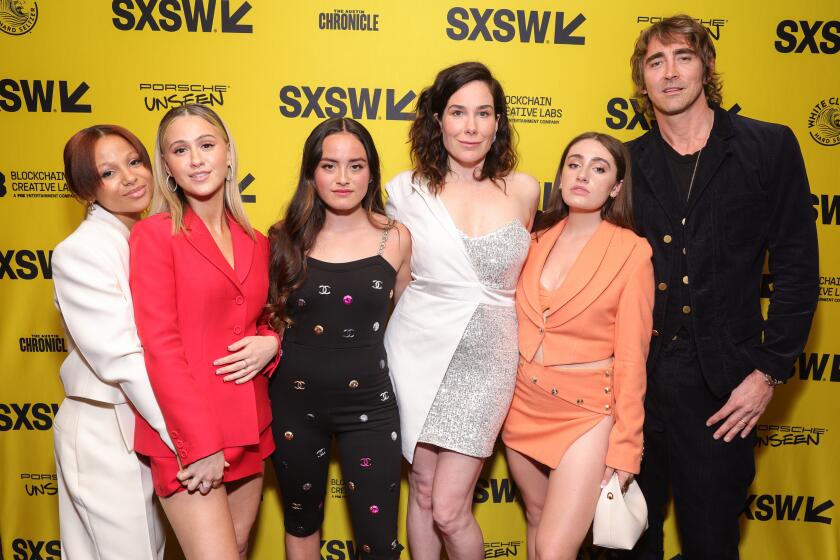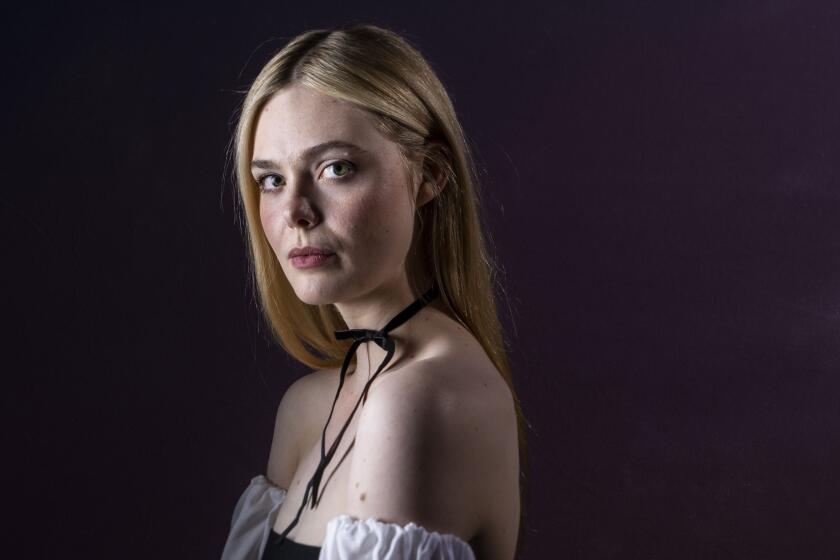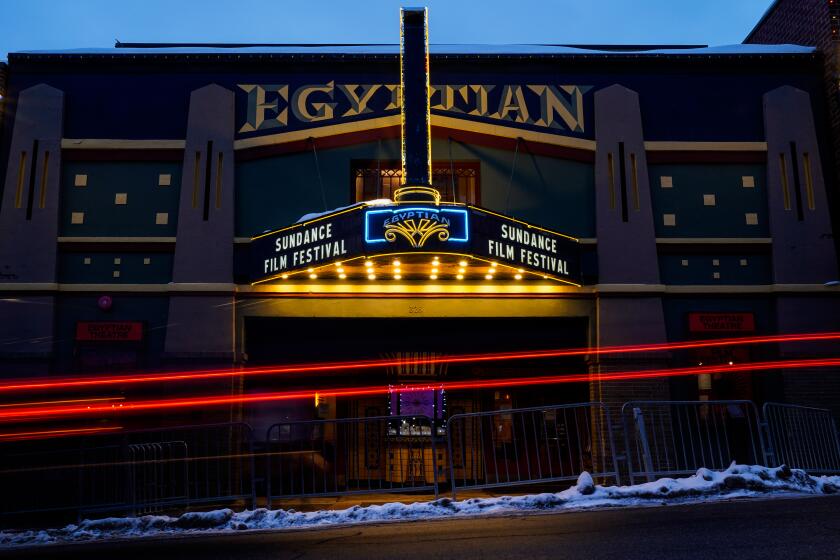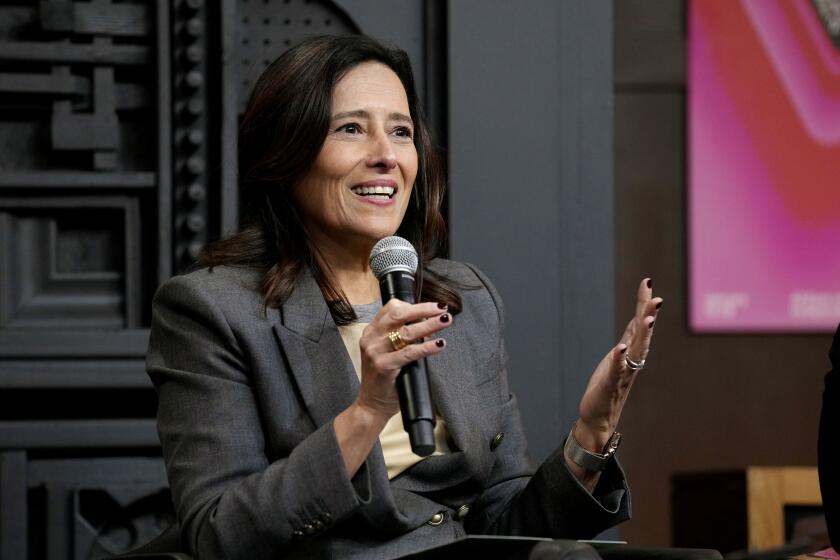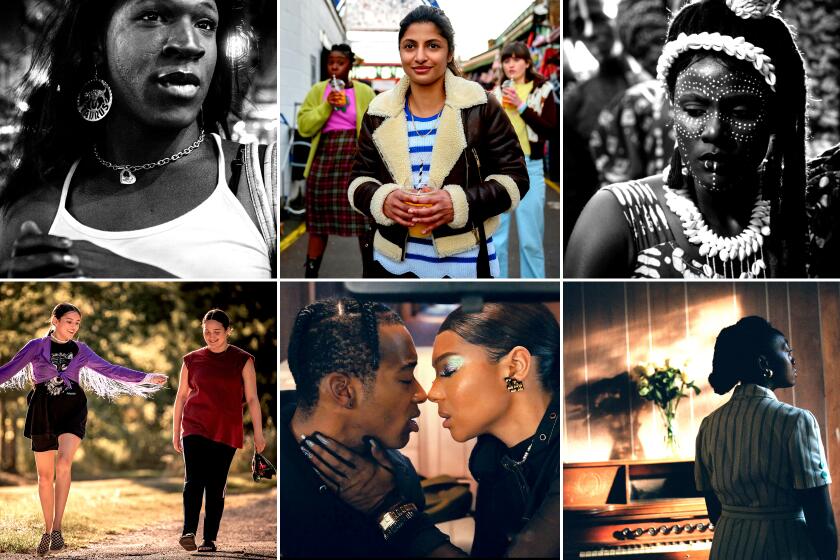Even from this out-of-the-ordinary virtual year of Sundance, there are still bound to be breakout performances and newly minted stars-to-be. A solid bet for that annual distinction is Patti Harrison, one of the leads in the grounded comedy “Together Together.”
Written and directed by Nikole Beckwith, the film stars Harrison as Anna, a 20-something woman who is hired as a surrogate by a 40-something single man (Ed Helms). As the pregnancy progresses the two loners soon strike up an unlikely friendship. The cast also includes Tig Notaro, Julio Torres and Anna Konkle.
The sensitive earnestness of her performance in “Together Together” is something new from Harrison, who first made a name for herself as an acerbic, absurdist stand-up comedian. She has appeared on television shows such “High Maintenance,” “Broad City” and “Shrill” and was also in the 2018 film “A Simple Favor” and worked as a writer on the series “Big Mouth” and “Dispatches From Elsewhere.”
Premiering as part of the festival’s U.S. Dramatic Competition, “Together Together” is scheduled to be released by Bleecker Street later this year. Harrison sat for a video call from her home in Los Angeles ahead of the festival.
With this being your first lead role in a movie, do you consider yourself more of a comedian, an actress or just sort of an all-purpose performer? How does the movie role fit into how you see yourself?
Patti Harrison: I think I identify as a comedian before kind of anything else. Before I identify as a person, as a human being with empathy. I would say that in terms of tracking the career paths of a lot of comedians, it’s an interesting one because there’s so many different ways to do it. You could do stand-up, you’re doing a million bar shows and then a talent agent sees you and you kind of have the option to go do a stand-up tour and be a pretty by-the-book stand-up. People assume because you’re a comedian that you want to be an actor or that you want to be a writer too. It is a very cool kind of open-ended place to enter because I don’t know if I ever really imagined myself working in a writers room or acting in that capacity.
I’ve been pretty open to just seeing what my opportunities are and what comes my way. And this was something that I definitely hadn’t imagined happening. I mean, I think everyone has those weird side fantasies of, “What if one day I did something more dramatic?” People in creative industries have these adjacent creative urges, “But what if I became a musician? What if I became a painter?” I think it kind of fell under that.
Do you see the performance in the movie as essentially a dramatic one?
I think it’s because I have this bias of me being somewhat aware of myself and knowing myself, that it’s way more grounded and anchored in an emotional drive and purpose and the story that it’s telling than anything I write for myself. A lot of the stuff that I want to create personally is usually pretty absurd or silly comedy stuff.
So this does feel — even though I understand that it is a comedy, a lot of the goofier moments in the movie don’t come from Anna’s character necessarily. It comes from these orbiting characters like Julio Torres or Greta Titelman or Anna Konkle coming in. And they have these opportunities to add this levity and a fun chemistry. But I think the purpose is more nuanced than anything I ever aspired to do as a comedian, as someone who identifies as a silly comedian.
So were you curious or confused by why Nikole wanted to cast you? Was it hard for you to adjust to what this role needed?
It was a weird adjustment. Any time I get something sent to me I just assume they want something very silly. I get typecast as kind of a bitchy assistant, a young millennial assistant. I don’t know if millennial is young anymore.
At first I was very hesitant about the tone and what she specifically wanted me to be able to deliver to it. And I’m transgender. Is this like a stunt casting thing? There were all these questions because we hadn’t met before. And then when we did meet initially, it was like a beautiful first date. I feel like the story of the movie, the skeleton of the movie is kind of the skeleton of my friendship with Nikole now. Where I’m platonically deeply in love with her.
As a trans performer, to be cast in a cisgender role where your transness is not part of the role, what does that mean to you?
I think that it can be looked at in probably a pretty heady way, if you think about just all of the layers of it, but I think it was a lot simpler than that.
It’s been interesting to think about why I started trying to make stuff, do comedy and act and write. And a lot of the stuff that I found personally interesting to write and create was stuff that didn’t have to do with me being trans. Because for me, getting to do comedy or getting this creative outlet served as an escape to not think about this one lens that I’ve been pigeonholed in for this part of my life and that people have a hard time seeing me outside of — to see me as a fully fleshed-out person.
Everything else that I’ve ever filmed I’ve had to shoot maybe two or three days a week, cause I’m in a scene or two, I’m a supporting character. So it’s really fun and breezy, and I just get to fly in and be silly and leave. But this was a lot more work, and it was in this character who wasn’t trans, and it’s a plot point the movie depends on, the fact that this character is cis. But it really helped. I was focusing on anything else for a full month than me thinking about being trans, and it was just a lot of work, and it took me out of this headspace. I was pretty tired, but I think it was a good kind of tired.
This movie specifically felt really special because it was something that I never really thought I was going to get to do. And when I say that, I just didn’t think I’d be playing a pregnant woman in a movie that is earnest. And I want there to be more opportunities for marginalized people who are in the creative industries. Because I do think representation is really important.
I know that a lot of people say that, but not all representation is good, and we need good representation. And that means letting people play roles outside of what their boxes are, what society tells them their boxes are. So this really felt like that for me. And it was really cool and weirdly healing at a time I think in my life when I was feeling pretty farted out.
The energy of the movie in some ways is the energy of a commercial rom-com, which it is not. Just as a viewer, you’re so programmed to respond that if there are two people in a story they should get together. As a performer was it hard to not want to play some of those scenes with Ed in a more romantic way or to lean into those kinds of emotions?
When I first started to read the script, I was really worried that it was another movie about an older man meeting a young girl and that romance, and I was afraid of that. Cause I think there’s too much of that. And I don’t find that interesting. And it subverted that in a way that I was really excited about, it was a newer idea. And that’s what is interesting art to me, something that can really show you something or make you feel something in a new way. And maybe it can be something that’s completely new or it can be something that’s taking a familiar palette and then just kind of retooling things a little bit to change the entire message and audience experience with the work that you’re doing.
This is why the monologue about Woody Allen movies you deliver is so exciting, it goes head-on at a conventional wisdom and dissects it in a really smart way, dismantling the dynamics of “Manhattan” and “Annie Hall.” Did that really jump out at you when you first read the script?
That moment in the script was one of the defining moments that subverted my understanding and expectations for the whole movie, because like I said, I was really worried that it was just going to be like some rom-com when I was reading it. And then you hit that moment, and it addressed all my fears very explicitly. And I thought it was so cool. Nikole’s a very, very concise, hyperarticulate person and as a filmmaker I noticed that she has a lot of thoughts about the film and television industry. I haven’t been in it very long at all. I feel like I’m just like starting to step foot into it and scan the environment and see what things are like.
A wide range of narrative and documentaries highlights to watch for at the first virtual Sundance Film Festival.
I think for a lot of people the first time they saw you was when you spoke about the Trump administration’s trans military ban on Jimmy Fallon’s show. That ban has now been lifted by the new administration. Do you have anything that you want to say about that?
I will say that the Trump presidency, when that happened, it was such a moment of like, “Well, it’s beginning,” like this is what’s to come. And it really was. It really foreshadowed a lot of horrible, horrible stuff. The sense of weight that was lifted when Trump lost was so immense. And I think there’s a lot of little performative actions we’re going to see from Kamala and Biden that are just going to be to appease the liberal Twitter base.
I’m at a point where I’m just like, “We should all have the same access and the same rights,” but there are things also now that are affecting trans people a lot worse. Because not every trans person is trying to serve in the military. It does feel like a nice little bookend, them repealing it, but I think they need to do a lot more.
And we have to start at the baseline that everyone has this equality and then we get to equanimity. I think the TLDR is that it’s a good thing, but there’s more work. There’s a lot more work they need to do.
More to Read
Only good movies
Get the Indie Focus newsletter, Mark Olsen's weekly guide to the world of cinema.
You may occasionally receive promotional content from the Los Angeles Times.
